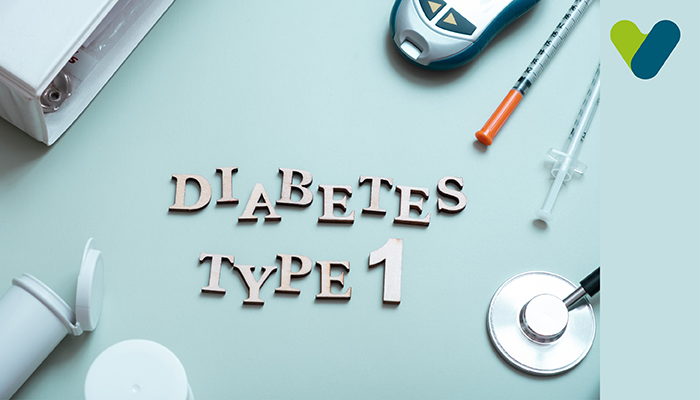Most people having type 1 diabetes should be treated with a daily multiple injection regimen of prandial insulin and basal insulin or regular subcutaneous insulin infusion. Most individuals having type 1 diabetes should operate rapid-acting insulin similarity to reduce hypoglycemia risk.
What Is Type 1 Diabetes?
Type 1 diabetes is a condition where the immune system damages insulin-making cells in your pancreas. These are known as beta cells. In children and young people this condition is usually diagnosed, so it used to be called juvenile diabetes.Like type 1 a condition called secondary diabetes , but your beta cells are removed out by a disease or an injury in your pancreas rather than by your immune system.
Both of these have a difference from type 2 diabetes where your body doesn’t react to insulin the way it should.
Symptoms of Type 1 Diabetes
Mentioned below are the type-1 diabetes symptoms.They include:- Extreme thirst
- Increased hunger (especially after eating)
- Dry mouth
- Upset stomach and vomiting
- Frequent urination
- Unexplained weight loss
- Fatigue
- Blurry vision
- Heavy, labored breathing
- Infections in your skin, urinary tract, or vagina
- Crankiness or mood changes
- Bedwetting in a child
- Shaking and confusion
- Rapid breathing
- Fruity smell to your breath
- Belly pain
- Loss of consciousness (rare)
Causes of Type 1 Diabetes
Insulin is a hormone that transfers sugar or glucose into your body's tissues. It is used as fuel in your cells.Glucose doesn’t go into your cells because insulin isn’t to do the job. Instead, it makes up in your blood, and your cells starve. This rise high blood sugar, which can lead to:
- Dehydration. You pee more when there’s extra sugar in your blood. That's the way your body's getting rid of it. A large amount of water moves out with the urine causing your body to dry out.
- Weight loss. The glucose that moves out when you pee takes calories with it. Many people with high blood sugar reduce their weight. Dehydration is also a part.
- Diabetic ketoacidosis (DKA). It breaks down fat cells instead if your body can't get enough glucose for fuel. This produces chemicals called ketones. Your liver clears the sugar that store to help out. But your body can’t use it without insulin, so in your blood, it builds up along with the acidic ketones. This combination of extra glucose, dehydration, and acid buildup is known as ketoacidosis and if not treated right away it can be life-threatening.
- Damage to your body. High glucose levels in your blood can damage the nerves over time and small blood vessels in your eyes, kidneys, and heart. They can also build you more likely to get hardened arteries, or atherosclerosis, which can cause heart attacks and strokes.
Risk Factors of Type 1 Diabetes
Here are the risk factors for type 1 diabetes include:- Family history. Anyone parent having type 1 diabetes has a hardly increased risk of developing the condition.
- Genetics. Certain genes indicate a high risk of developing type 1 diabetes.
- Geography. The incidence of type 1 diabetes is going to increase as you travel away from the equator.
- Age. Although it appears at two noticeable peaks at any age type 1 diabetes can appear. The first peak appears in children between 4 and 7 years old, and the second is between 10 and 14 years of age in children.
Treatment for Type-1 Diabetes
For type 1 diabetes insulin is the main treatment for this diabetes. People can use:- a needle and syringe
- an insulin pen
- an insulin pump
A doctor will suggest the best option for each person.
Is Type 1 Diabetes Dangerous?
A person suffering from type 1 diabetes is at risk of developing DKA, which can be life-threatening.They also face a risk of hypoglycemia if they take too much insulin, also known as low blood sugar. It includes these symptoms-:
- confusion
- fatigue
- seizures
- coma
- in some cases, death
Complications in Type 1 Diabetes
Here are the complications of type-1 diabetes-- Heart disease
- Stroke
- Kidney disease
- Low blood sugar, or hypoglycemia
- Nerve damage, or diabetic retinopathy
- Slow-healing wounds
- Foot problems
- Limb amputations
- Eye problems and blindness, or diabetic retinopathy
- Dental disease
- Bladder problems
- Sexual dysfunction


